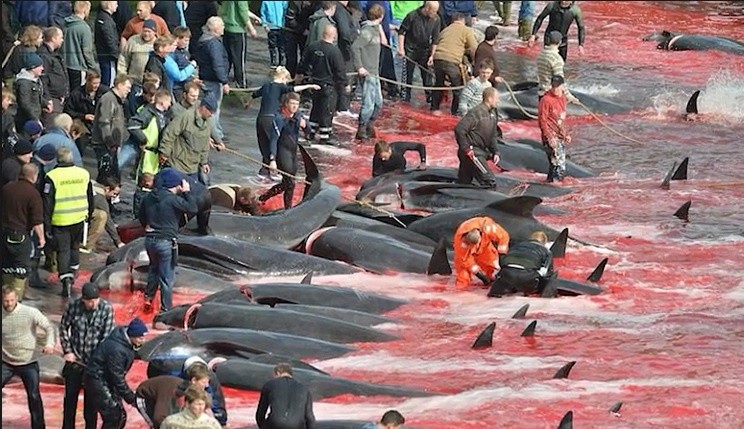As a quota of 500 dolphins is set for slaughter, the Faroe Islands have been dubbed an "abattoir." Following outrage over the slaughter of 1,480 white-sided dolphins last year, environmentalists believe new government hunt quotas are 'farcical.'

Setting a Quota
Months after the widely condemned death of over 1,400 white-sided dolphins in the Faroe Islands, the Faroese government has established an initial yearly hunt quota of 500 in what protesters describe as a "farcical" move.
árni Skaale, the Faroese fisheries minister, stated that the quota was set to ensure sustainability. "We have a right to hunt," he told the Guardian, but he also stressed the need to protect the country's resources: "We have to use everything sustainably."
The quota is set to affect at the end of July, and the government claims it represents a small portion of the estimated 80,000 whales and dolphins in the North Atlantic. It will remain in place until 2024.
Unprecedented Scale
The scale of last year's cull was unprecedented. Since 1996, the Faroe Islands have killed an average of 270 white-sided dolphins yearly, including the 1,428 killed last year. Only three previous years during that time span had more than 500 dolphins killed: 2001, 2002, and 2006.
"The Faroese government's declaration is ridiculous," said Sally Hamilton, director of the marine conservation nonprofit Orca.
"The Faroes had formalized what was previously unformalized, approving the murder when it was never certain how many dolphins would be slaughtered yearly - if any at all."
Also Read : Culture or Cruelty? People Are Outraged After 1500 Dolphins Were Massacred in Faroe Island
Criticisms and Outcry
"The Faroes have become a slaughterhouse for marine animals," she said, "and the country appears indifferent about the international indignation and criticism this is bringing."
Skaale claimed that the 500-person restriction was appropriate. "It will avoid another hunt like last year," he added.
Orca's head of partnerships, Steve Jones, called the statement, establishing a quota for killing Atlantic white-sided dolphins rather than the customary "Grindadráp," as the yearly massacre of pilot whales is known, a "smoke-and-mirror operation."
"To establish a quota is to formalize a hunt that did not previously exist as a traditional hunt and which polls have revealed that Faroe Islanders do not desire," he added. It is a concerning trend toward an unsustainable hunt. White-sided dolphin meat has no market."
Dolphin Massacre
The massive massacre last year sparked international outrage and exposed local opposition. According to a poll conducted following the murder, although 83 percent of islanders supported the killing of pilot whales, 53 percent opposed the killing of white-sided dolphins.
Companies also spoke out against the deaths. Bakkafrost, the island's largest salmon farming company, released a statement calling the slaughter "very reprehensible." The Faroese Aquaculture Association, representing fish producers, asked for a blanket ban on the slaughter of white-sided dolphins in February.
Reviewing the Quota
The Faroese government has said that the quota will be reviewed in 2024, using new information on dolphin populations from the North Atlantic Marine Mammal Commission, representing the region's four whale-hunting countries: Norway, Iceland, Greenland, and the Faroe Islands.
Related Article : As Demand Decreases, Iceland will Finally End Commercial Whaling in 2024
For more animal, don't forget to follow Nature World News!
© 2026 NatureWorldNews.com All rights reserved. Do not reproduce without permission.





